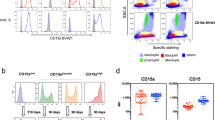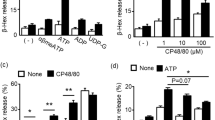Abstract
Cromoglycate, which inhibits IgE-mediated degranulation of mast cells1,2 and a basophilic rat tumour cell line (RBL-2H3) (ref. 3), is a drug widely used in the treatment of allergic asthma. We have demonstrated the presence of specific binding sites for that drug on the membranes of basophils and mast cells4 and more recently, we have succeeded in isolating the cromoglycate-binding protein from the membranes of RBL-2H3 cells5. These findings together with the chelation by cromoglycate of alkaline-earth ions in low polarity medium6,7, suggest that the binding site of the drug may either be part, or closely related to the calcium gate. To further investigate this, we have selected variants of the RBL–2H3 cell line that are defective in cromoglycate binding but bind IgE normally. In these variants, which have similar histamine content to the parental cells, IgE-mediated challenge did not lead to Ca2+ influx, degranulation and histamine release. In contrast, these cells were able to release histamine on exposure to the Ca2+ ionophore A23187, indicating that the degranulation mechanism distal to the Ca2+ gating step is unaffected. Taken together, these findings suggest that cromoglycate-binding protein has a role in the transmem-brane calcium influx which induces degranulation.
This is a preview of subscription content, access via your institution
Access options
Subscribe to this journal
Receive 51 print issues and online access
$199.00 per year
only $3.90 per issue
Buy this article
- Purchase on Springer Link
- Instant access to full article PDF
Prices may be subject to local taxes which are calculated during checkout
Similar content being viewed by others
References
Foreman, J. C. & Garland, L. G. Br. med. J. i, 820–821 (1976).
Spataro, A. C. & Bormann, H. B. Chem. Pharmac. 25, 505–510 (1976).
Mazurek, N., Bashkin, P., Loyter, A. & Pecht, I. Proc. natn. Acad. Sci. U.S.A. (in the press).
Mazurek, N., Berger, G. & Pecht, I. Nature 286, 722–723 (1980).
Mazurek, N., Bashkin, P. & Pecht, I. EMBO J. 1, 505–590 (1982).
Spitzer, J. C. Int. Archs. Allergy appl. Immun. 60, 356–358 (1979).
Mazurek, N., Geller-Bernstein, C. & Pecht, I. FEBS Lett. 111, 194–196 (1980).
Eshhar, Z., Ofarim, M. & Waks, T. J. Immun. 124, 69–695 (1980).
Fewtrell, C. & Metzger, H. Proc. FASEB Ser. 14, 295–314 (1981).
Fewtrell, C., Lagunoff, D. & Metzger, H. Biochim. biophys. Acta 644, 363–368 (1981).
Shore, A. P., Buckhalter, A. & Cohen, H. V. J. Pharmac. exp. Ther. 127, 182–186 (1950).
McGivney, A., Crews, F. T., Hirata, F., Axelrod, J. & Siraganian, R. Proc. natn. Acad. Sci. U.S.A. 78, 6176–6180 (1981).
Taurog, J. D., Fewtrell, C. & Becker, E. L. J. Immun. 122, 2150–2153.
Author information
Authors and Affiliations
Rights and permissions
About this article
Cite this article
Mazurek, N., Bashkin, P., Petrank, A. et al. Basophil variants with impaired cromoglycate binding do not respond to an immunological degranulation stimulus. Nature 303, 528–530 (1983). https://doi.org/10.1038/303528a0
Received:
Accepted:
Published:
Issue Date:
DOI: https://doi.org/10.1038/303528a0
This article is cited by
-
The RBL-2H3 cell line: its provenance and suitability as a model for the mast cell
Inflammation Research (2009)
-
Non-specific effects of calcium entry antagonists in mast cells
Pfl�gers Archiv European Journal of Physiology (1994)
-
The protective effect of a new antiallergic agent, KP-136 on mast cell activation: A comparison with disodium cromoglycate
Agents and Actions (1988)
Comments
By submitting a comment you agree to abide by our Terms and Community Guidelines. If you find something abusive or that does not comply with our terms or guidelines please flag it as inappropriate.



